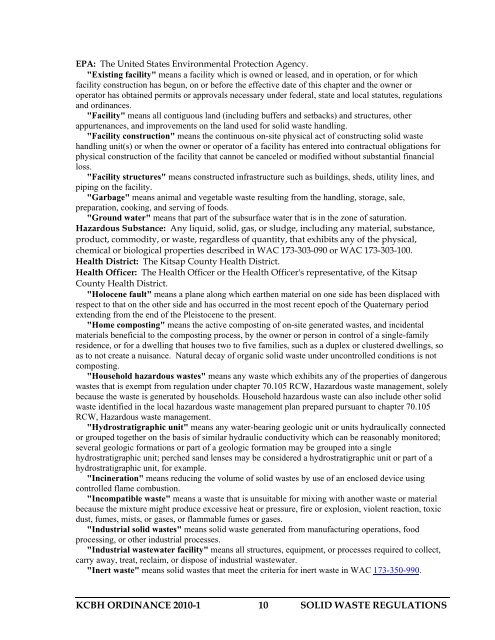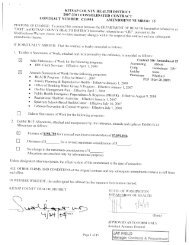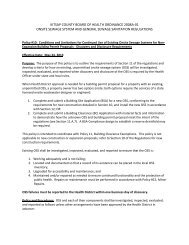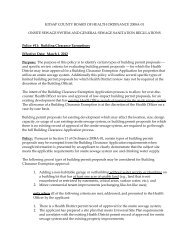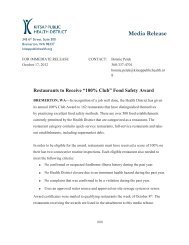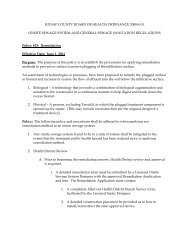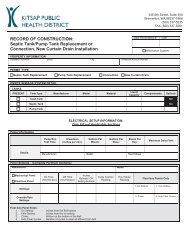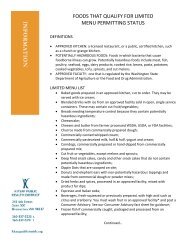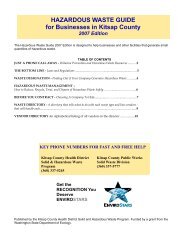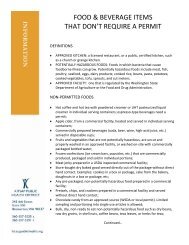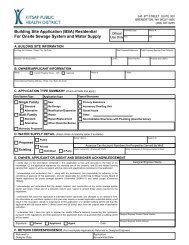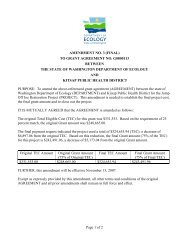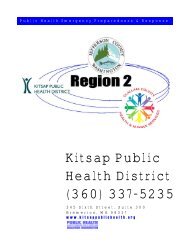SOLID WASTE REGULATIONS - Kitsap Public Health District
SOLID WASTE REGULATIONS - Kitsap Public Health District
SOLID WASTE REGULATIONS - Kitsap Public Health District
You also want an ePaper? Increase the reach of your titles
YUMPU automatically turns print PDFs into web optimized ePapers that Google loves.
EPA: The United States Environmental Protection Agency.<br />
"Existing facility" means a facility which is owned or leased, and in operation, or for which<br />
facility construction has begun, on or before the effective date of this chapter and the owner or<br />
operator has obtained permits or approvals necessary under federal, state and local statutes, regulations<br />
and ordinances.<br />
"Facility" means all contiguous land (including buffers and setbacks) and structures, other<br />
appurtenances, and improvements on the land used for solid waste handling.<br />
"Facility construction" means the continuous on-site physical act of constructing solid waste<br />
handling unit(s) or when the owner or operator of a facility has entered into contractual obligations for<br />
physical construction of the facility that cannot be canceled or modified without substantial financial<br />
loss.<br />
"Facility structures" means constructed infrastructure such as buildings, sheds, utility lines, and<br />
piping on the facility.<br />
"Garbage" means animal and vegetable waste resulting from the handling, storage, sale,<br />
preparation, cooking, and serving of foods.<br />
"Ground water" means that part of the subsurface water that is in the zone of saturation.<br />
Hazardous Substance: Any liquid, solid, gas, or sludge, including any material, substance,<br />
product, commodity, or waste, regardless of quantity, that exhibits any of the physical,<br />
chemical or biological properties described in WAC 173-303-090 or WAC 173-303-100.<br />
<strong>Health</strong> <strong>District</strong>: The <strong>Kitsap</strong> County <strong>Health</strong> <strong>District</strong>.<br />
<strong>Health</strong> Officer: The <strong>Health</strong> Officer or the <strong>Health</strong> Officer's representative, of the <strong>Kitsap</strong><br />
County <strong>Health</strong> <strong>District</strong>.<br />
"Holocene fault" means a plane along which earthen material on one side has been displaced with<br />
respect to that on the other side and has occurred in the most recent epoch of the Quaternary period<br />
extending from the end of the Pleistocene to the present.<br />
"Home composting" means the active composting of on-site generated wastes, and incidental<br />
materials beneficial to the composting process, by the owner or person in control of a single-family<br />
residence, or for a dwelling that houses two to five families, such as a duplex or clustered dwellings, so<br />
as to not create a nuisance. Natural decay of organic solid waste under uncontrolled conditions is not<br />
composting.<br />
"Household hazardous wastes" means any waste which exhibits any of the properties of dangerous<br />
wastes that is exempt from regulation under chapter 70.105 RCW, Hazardous waste management, solely<br />
because the waste is generated by households. Household hazardous waste can also include other solid<br />
waste identified in the local hazardous waste management plan prepared pursuant to chapter 70.105<br />
RCW, Hazardous waste management.<br />
"Hydrostratigraphic unit" means any water-bearing geologic unit or units hydraulically connected<br />
or grouped together on the basis of similar hydraulic conductivity which can be reasonably monitored;<br />
several geologic formations or part of a geologic formation may be grouped into a single<br />
hydrostratigraphic unit; perched sand lenses may be considered a hydrostratigraphic unit or part of a<br />
hydrostratigraphic unit, for example.<br />
"Incineration" means reducing the volume of solid wastes by use of an enclosed device using<br />
controlled flame combustion.<br />
"Incompatible waste" means a waste that is unsuitable for mixing with another waste or material<br />
because the mixture might produce excessive heat or pressure, fire or explosion, violent reaction, toxic<br />
dust, fumes, mists, or gases, or flammable fumes or gases.<br />
"Industrial solid wastes" means solid waste generated from manufacturing operations, food<br />
processing, or other industrial processes.<br />
"Industrial wastewater facility" means all structures, equipment, or processes required to collect,<br />
carry away, treat, reclaim, or dispose of industrial wastewater.<br />
"Inert waste" means solid wastes that meet the criteria for inert waste in WAC 173-350-990.<br />
KCBH ORDINANCE 2010-1 10 <strong>SOLID</strong> <strong>WASTE</strong> <strong>REGULATIONS</strong>


